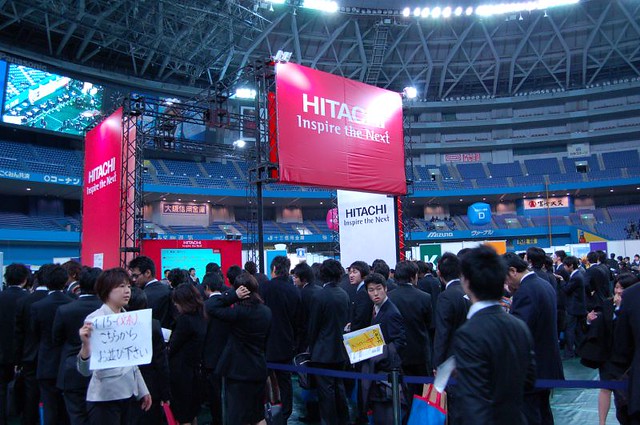10 Phrases Japanese Black Companies use in Job Descriptions
2013-12-25 TweetI’ve talked about black companies before, and of course the general consensus is to avoid them altogether. But how do you know that you’re dealing with a black company? Except maybe after entering. Well, besides digging through Google and reading up about the company, you can get several clues even just looking at their job post. Referencing an article from Niconico News , here I’m going to teach you the phrases bad Japanese companies use in their job descriptions. When you see these, you should watch out and be extra diligent on researching the company.
1.「学歴不問」「年齢不問」「業務経験不問」「未経験者歓迎」
What it means: No experience necessary. No minimum education level necessary.
What it ACTUALLY means: It’s low level work, with minimum pay. People don’t stick around, so we just want as many applicants we can get.
You should always be wary when the requirements are strangely loose. This usually means that they only want warm bodies to fill the seats, since employee turnover is high. Also, higher schooling usually equates to higher starting salary, i.e. university grads make more than high school grads, so if you have a degree, don’t settle for less.
2.「人物重視」
What it means: Emphasis on "character".
What it ACTUALLY means: We just need warm bodies to fill seats.
Similar to number 1, this is purposely setting the bar low to get as many applicants as possible. Of course character is important, that’s why companies have interviews!
3.「若手抜擢」「若い社員が多い」「若手が働きやすい」「幹部候補」
What it means: Lots of young employees. Young, vibrant culture! No old oji-san around to hassle you!
What it ACTUALLY means: We can only get young & gullible people to join us. No one stays around long, so anything resembling career advancement is non-existent.
Huge emphasis on ‘youth’ is big red flag. While smaller companies, especially young startups, may actually have mostly young people working them, good companies don’t tend to advertise that point. This is because good companies know that great talent can come from anywhere, so they tend to keep their options open.
4.「将来は独立も可能」
What it means: Career flexibility. You can switch to freelance in the future.
What it ACTUALLY means: No job security and high employee turnover rate.
You can always quit from any company, either moving to a different one or go freelance, so this isn’t even an issue that needs to be considered. More likely than not, this is indicative of employees not sticking around for long.
5.「がんばった分だけ報われる」「実力主義」「成果主義」
「給与は能力による考慮」
What it means: Performance-based pay. The more you work, the more money you'll earn!
What it ACTUALLY means: We’ll pay you a minimal amount, and you’ll have to work ridiculous hours to make standard pay.
Be wary of performance-based pay scales. In some fields, like sales, this type of system is more prevalent. Some people thrive in these situations, and there are circumstances where it does pay more, so consider your options wisely.
6.「成長できる職場」
What it means: Working environment where you can learn and mature.
What it ACTUALLY means: Expect hazing and high-pressure work environment.
Good companies will get you chances to grow your career, though ultimately you’re responsible for your own growth. Ask around and talk to the other employees to find out what’s it’s like working there.
7.「ノルマなし」
What it means: No quotas to fulfill.
What it ACTUALLY means: There are quotas. We're twisting the definition to make this statement true.
Quotas are common in sales type jobs. If the job is for sales, the fact that they have to mention 'no quotas' sends a red flag. More likely, quotas still exist, but in a different wording. For example, maybe there's no personal quota, but a group/section quota. Another possibility is that regular customers already exists, and all you have to do is go down the list and contact them regularly (this is sometimes called ルート営業).
8.「少数精鋭」
What it means: Only a selected few are accepted.
What it ACTUALLY means: We’re understaffed, so you’ll be doing several people’s work load.
While it could mean that they only select ‘the best of the best’ from the applicants, this tend to be a given for good companies that people want to work at, so it’s a pointless thing to advertise.
9.「給料○万円保証」
What it means: Guaranteed income of X00,000 yen.
What it ACTUALLY means: There’s no pay for overtime.
Be wary of unusually high salary. Check around (link) for a general range of pay you should expect for your position. Also pay attention on whether or not this payment includes overtime, which means any overtime you do is assumed to be ‘pre-payed’. Look for words such as 「サービス残業」 and 「固定残業代」(wikipedia link).
10.「家族的な社風」
What it means: Friendly atmosphere! Your co-workers are just like family.
What it ACTUALLY means: You won’t be able to go home most of the time, so your co-workers are your new family now.
Efforts to make the office have a more ‘home’ feeling, while not bad in itself, is also indicative that they expect you to stay there a lot.
Lot of my comments seem cynical, but regardless of what the job advertisement say, always do your research. Ask questions to the employees, go online and look up the company’s name. Ask people you trust what they think. Do your homework and be better informed on the company’s profile.
Photo credit: aziat

